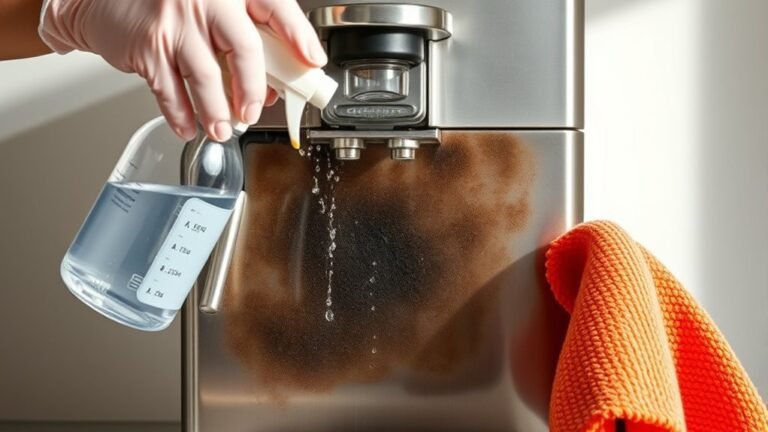Eco-Friendly Alternatives to Dishwasher
If you want eco-friendly alternatives to a dishwasher, try hand washing with biodegradable soaps to save water and avoid harmful chemicals. You could also use solar-powered dishwashers or steam cleaning tools to cut energy use. Consider collecting rainwater or setting up greywater systems to reuse water sustainably. Switching to bamboo brushes and enzyme-based cleaners helps reduce plastic and chemicals. These simple swaps let you clean effectively while supporting the environment — and there’s more practical tips to explore.
Hand Washing With Biodegradable Soaps

While hand washing dishes might seem old-fashioned, using biodegradable soaps makes it a surprisingly eco-friendly choice. When you choose biodegradable soap, you’re tapping into the biodegradable soap benefits that protect waterways from harmful chemicals. This means you’re not just cleaning your plates—you’re preserving the freedom to enjoy nature’s purity. Eco friendly washing with these soaps guarantees less toxic runoff, reducing your environmental impact without sacrificing cleanliness. Plus, hand washing gives you full control over water use, helping you conserve this precious resource. By embracing this simple habit, you’re making a conscious decision to live sustainably and independently, free from reliance on energy-heavy appliances. It’s a small act that aligns with your desire for freedom and responsibility toward the planet.
Utilizing Solar-Powered Dishwashers
You can cut energy costs considerably by using a solar-powered dishwasher, which relies on renewable energy from the sun. To get the most out of it, you’ll want to take into account proper installation to maximize sunlight exposure and perform regular maintenance to keep it running efficiently. These steps guarantee you’re making the most eco-friendly choice without sacrificing convenience.
Benefits of Solar Power
Since solar power taps into a limitless and clean energy source, using solar-powered dishwashers can considerably cut your household’s carbon footprint. You get to enjoy freedom from rising energy bills while embracing renewable energy sources. Solar panel efficiency has improved, making these dishwashers more reliable and cost-effective. Plus, you’re less dependent on the grid, giving you peace of mind during outages. Here’s a quick look at the benefits:
| Benefit | Description | Impact on You |
|---|---|---|
| Reduced Emissions | Uses clean, renewable energy | Lowers your carbon footprint |
| Cost Savings | Lowers electricity bills | More freedom with your money |
| Energy Independence | Less reliance on traditional power | Greater control over energy |
| Sustainability | Supports eco-friendly choices | Aligns with your values |
| Improved Efficiency | Advances in solar panel technology | Reliable dishwasher use |
Installation and Maintenance Tips
Although installing a solar-powered dishwasher might seem challenging at first, following some key tips can make the process smoother and more efficient. Start by researching installation techniques that fit your home’s layout and energy needs. Make sure your solar panels are positioned to capture maximum sunlight for consistent power. You don’t have to be bound by complicated setups—choose systems designed for easy integration. Once installed, sticking to regular maintenance schedules is essential to keep everything running freely. Clean filters, check panels for debris, and monitor battery health to avoid unexpected downtime. By taking control of installation and upkeep, you embrace true independence from traditional energy sources, making your eco-friendly dishwasher a reliable part of your sustainable lifestyle.
Implementing Greywater Systems for Dishwashing

If you want to cut down on water waste, setting up a greywater system for dishwashing is a smart move. You’ll need to understand how the system works, consider installation challenges, and keep up with regular maintenance to guarantee safety. Let’s look at what’s involved in making this eco-friendly switch.
Greywater System Basics
A greywater system lets you reuse gently used water from your sinks, showers, and washing machines to reduce waste and save resources. By capturing this water, you can divert it for dishwashing purposes, cutting down your freshwater usage considerably. To keep things safe and efficient, greywater filtration is essential—it removes food particles and soap residues, ensuring the water is clean enough for reuse without harming your plumbing. Embracing sustainable plumbing techniques, these systems fit seamlessly into your home, giving you control over water consumption while promoting environmental freedom. With a basic understanding of greywater system basics, you empower yourself to save water, lower bills, and reduce your ecological footprint—all without compromising convenience or cleanliness in your kitchen.
Installation Considerations
When you’re ready to install a greywater system for dishwashing, several key factors need your attention to guarantee efficient and safe operation. Understanding installation requirements is vital to assure your dishwasher alternatives work seamlessly without compromising water quality or plumbing integrity. You’ll want to assess space, plumbing compatibility, and local regulations before starting.
| Factor | Description | Importance |
|---|---|---|
| Plumbing Setup | Connects greywater to dishwashing | Guarantees water reuse efficiency |
| Space Availability | Room for tanks and filters | Affects system size and placement |
| Legal Compliance | Follow local codes and permits | Avoids fines and health issues |
| Water Quality | Filtration and treatment | Protects your health and freedom |
Maintenance and Safety
Though greywater systems can save significant amounts of water, you’ll need to stay vigilant with maintenance to keep everything running smoothly and safely. Proper dishwasher care is vital when using greywater to prevent clogs and contamination. Here are essential safety tips to reflect upon:
- Regularly clean filters and pipes to avoid buildup and odors.
- Use biodegradable, non-toxic soaps to protect your system and the environment.
- Inspect connections and storage tanks frequently for leaks or damage.
Employing Steam Cleaning Techniques

Since you want to cut down on chemical use and energy consumption, employing steam cleaning techniques can be a great alternative for washing your dishes. Steam cleaning benefits include powerful sanitation without harsh detergents, saving you from toxic residues. The high temperature of steam effectively breaks down grease and kills bacteria, giving you clean dishes while respecting the environment. You don’t need complicated setups—steam cleaning equipment ranges from handheld steamers to countertop devices designed specifically for kitchenware. These tools allow you to regain control over your cleaning routine, freeing you from reliance on conventional dishwashers. By choosing steam cleaning, you embrace a method that’s gentle on both your dishes and the planet, aligning perfectly with your desire for eco-friendly, energy-efficient freedom in your daily chores.
Using Eco-Friendly Scrubbing Tools
If you’re aiming to reduce waste and chemical use in your kitchen, switching to eco-friendly scrubbing tools is a smart move. These tools, often made from sustainable materials and natural fibers, help you clean effectively while staying true to your values. You’ll enjoy the freedom of knowing you’re minimizing your environmental footprint without sacrificing performance.
Switch to eco-friendly scrubbing tools to clean effectively and reduce your kitchen’s environmental impact.
Consider these options:
- Brushes with bamboo handles and coconut fiber bristles for durability and biodegradability.
- Reusable scrubbing pads crafted from organic cotton or hemp for gentle yet thorough cleaning.
- Loofah sponges made from natural plant fibers that break down naturally after use.
Adopting Cold Water Dishwashing Methods
When you choose to wash dishes with cold water, you cut down considerably on energy use and lower your utility bills. Cold water benefits go beyond just saving money—it helps you break free from reliance on heated water systems, giving you more control over your household’s energy consumption. You don’t have to compromise cleanliness either; with a good scrub and eco-friendly soap, cold water effectively removes most food residues. This method offers clear energy savings by eliminating the need to heat water, which often accounts for a large portion of your energy bill. Embracing cold water dishwashing lets you live more sustainably while enjoying the freedom to reduce your environmental impact without sacrificing dishwashing quality. It’s a simple, effective way to rethink your daily routine.
Exploring Enzyme-Based Dish Cleaning Products
You’ll find that enzyme-based dish cleaning products use natural enzymes to break down stubborn stains like grease and food residue. These enzymes target specific molecules, making them more effective and eco-friendly than traditional detergents. Plus, they often work well in cold water, saving energy while keeping your dishes clean.
How Enzymes Break Stains
Enzymes act as natural stain fighters by breaking down food particles on your dishes into smaller, more manageable pieces. This enzyme action targets tough stains, making stain removal effortless and eco-friendly. When you use enzyme-based cleaners, you’re letting nature do the hard work, freeing you from harsh chemicals.
Here’s how enzymes break down stains for you:
- Proteases cut through protein-based stains like eggs or cheese.
- Lipases dissolve fat and grease, clearing oily residues.
- Amylases tackle carbohydrate stains from sauces or starches.
Benefits Over Traditional Detergents
Although traditional detergents have been the go-to for dishwashing, enzyme-based products offer several advantages that make them worth considering. When you choose enzyme-based cleaners, you’re opting for natural ingredients that work efficiently to break down stubborn food residues without harsh chemicals. This means you get spotless dishes while reducing your exposure to synthetic substances. Plus, these products are environmentally friendly, so you’re helping to protect water sources and reduce pollution with every wash. Enzyme cleaners often require less water and energy, giving you more freedom to live sustainably without sacrificing cleanliness. By switching, you embrace a smarter, greener way to care for your kitchen and the planet — all while enjoying the convenience and effectiveness you expect from your dishwashing routine.
Incorporating Bamboo Dish Brushes and Sponges
Anyone looking to reduce plastic waste in their kitchen should consider switching to bamboo dish brushes and sponges. These tools tap into bamboo sustainability, offering a natural, biodegradable alternative to plastic scrubbers. When you make the switch, you’re choosing freedom from harmful plastics and embracing eco-friendly materials that break down naturally.
Switch to bamboo dish brushes and sponges for a sustainable, plastic-free, and naturally biodegradable kitchen solution.
Here’s why bamboo brushes and sponges are worth it:
- They’re made from biodegradable materials, so they won’t linger in landfills.
- Bamboo’s natural antimicrobial properties keep your cleaning tools fresher longer.
- Their sturdy design lets you clean effectively without harsh chemicals.
Setting Up Dish Drying Racks for Natural Air Drying
After switching to bamboo brushes and sponges, you might want to rethink how you dry your dishes to keep the eco-friendly momentum going. Setting up dish drying racks designed for natural air drying is a simple way to embrace freedom from electric dryers. Position your rack near a window or an open space to maximize natural ventilation, speeding up drying without energy use. Choose racks made from sustainable materials like bamboo or stainless steel to complement your eco-conscious setup. By mastering these dish drying techniques, you reduce waste and invite fresh air into your kitchen routine. This approach not only saves energy but also gives you control over your household’s environmental impact—letting you live freely and sustainably, one dish at a time.
Collecting and Reusing Rainwater for Washing Dishes
If you want to take your eco-friendly dishwashing efforts further, collecting and reusing rainwater is a smart move. Rainwater harvesting lets you cut down on tap water use while embracing a more sustainable lifestyle. To make the most of it, focus on these key steps:
- Set up a rainwater collection system with gutters directing water into a clean storage tank.
- Use an eco friendly filtration method like charcoal or sand filters to guarantee the water is safe for washing dishes.
- Regularly maintain your system to prevent contamination and keep your water fresh.
Frequently Asked Questions
How Do Eco-Friendly Dishwashing Methods Impact Water Bills?
If you switch to eco-friendly dishwashing methods, you’ll likely see a drop in your water consumption, which directly cuts down your water bills. These methods often use less water and focus on energy savings, so you’re not just saving money but also reducing your environmental footprint. You’ll feel freer knowing you’re making choices that benefit both your wallet and the planet without sacrificing cleanliness or convenience.
Are Eco-Friendly Dishwashing Alternatives Safe for Septic Systems?
Think of your septic system as a delicate ecosystem, much like a well-tended garden. When you choose eco-friendly dishwashing methods, you’re prioritizing septic safety by avoiding harsh chemicals that can disrupt this balance. These alternatives offer eco friendly efficacy, breaking down waste naturally without harming your system. So, you can enjoy the freedom of cleaner dishes and a healthy septic tank, all while protecting the environment with every wash.
Can Eco-Friendly Dishwashing Products Cause Allergies?
Yes, eco-friendly dishwashing products can cause allergies, especially if you have sensitive skin. It’s important you check ingredient transparency to avoid irritants like essential oils or certain plant extracts that might trigger reactions. Since you value freedom in your choices, you should look for products labeled hypoallergenic or fragrance-free. That way, you can confidently clean your dishes without worrying about uncomfortable skin issues or hidden allergens.
What Are the Long-Term Cost Savings of Using Eco-Friendly Dishwashing?
Think of your wallet as a garden—you’ve got to plant sustainable savings to watch it grow. By choosing eco-efficient choices like biodegradable detergents or manual washing methods, you’ll cut down on energy and water bills over time. These long-term savings give you the freedom to spend on what truly matters, all while reducing your environmental footprint. It’s a win-win that keeps both your finances and conscience feeling light.
How Do Eco-Friendly Dishwashing Methods Affect Kitchen Hygiene?
You might wonder how eco-friendly dishwashing affects sanitization effectiveness and bacteria growth. When done right, using natural cleaners and proper hot water rinses, you won’t compromise hygiene. In fact, these methods can effectively reduce bacteria growth without harsh chemicals. It gives you the freedom to keep your kitchen clean and safe while embracing a gentler, more sustainable routine that still meets your standards for a healthy home environment.






